- HOME
- ABOUT ME
- movies
- MEDIA
- L.Onerva
- Eino Leino
- Eeva-Liisa Manner
- Erään Opon päiväkirja
- Elämänkenttäni
- Elämäni ”viiva”
- Käyttöteoriani – se miten minä ohjaan
- Kulttuuritietoinen ja kansainvälistyvä ohjaus
- Ohjauksen järjestäminen maahanmuuttajakoulutuksessa
- Ohjauksen yhteiskunnallinen viitekehys
- Ohjaukäsite
- Oma opiskeluorientaatio
- Opiskelijoiden yksilöllisyys ohjauksessa
- EETTISET KYSYMYKSET
- Psykososiaalisen kehityksen teoria
- Suhteeni erilaisuuteen ja tehtäväni opinto-ohjaajana
- Opinto-ohjauksen ja erityisopetuksen yhtäläisyyksiä ja eroja
- Kehitykseni opinto-ohjaajana
- Maahanmuuttajan uraohjaus
- Maahanmuuttajien ohjaus ja neuvonta: kuka, mitä, miten?
- Ohjauksen tulevaisuus
- Elämänkenttäni
- Mariana Marin
- Claudiu Komartin
- Mariana Codrut
- Roland Erb
- Romanian poetry
- ESSAYS
- STORIES
- CLASSIC POETRY
- CONTEMPORARY POETRY
- TRANSLATED POEMS
- READING POETRY
- CONTACT
- translated Italian-English
- translated Italian-Romanian
- translated Spanish-English
- translated Spanish-Romanian
classic poetry
WARNING / AVERTISMENT
POSTED IN classic poetry January 20, 2024

WARNING / AVERTISMENT
When I am an old woman, I shall wear purple
With a red hat that doesn’t go, and doesn’t suit me.
And I shall spend my pension on brandy and summer gloves
And satin candles, and say we’ve no money for butter.
I shall sit down on the pavement when I am tired
And gobble up samples in shops and press alarm bells
And run my stick along the public railings
And make up for the sobriety of my youth.
I shall go out in my slippers in the rain
And pick the flowers in other people’s gardens
And learn to spit.You can wear terrible shirts and grow more fat
And eat three pounds of sausages at a go
Or only bread and pickles for a week
And hoard pens and pencils and beer nuts and things in boxes.But now we must have clothes that keep us dry
And pay our rent and not swear in the street
And set a good example for the children.
We must have friends to dinner and read the papers.But maybe I ought to practise a little now?
So people who know me are not too shocked and surprised
When suddenly I am old, and start to wear purple.
Jenny JOSEPH
…………………………
AVERTISMENTCând voi fi bătrână, voi purta mov
Cu o pălărie roșie care nu merge și nu mi se potrivește.
Și-mi voi cheltui pensia pe țuică și mănuși de vară
Și lumânări din satin și-oi spune că nu avem bani pentru unt.
M-oi așeza pe trotuar când sunt obosita
Și ma voi indopa cu mostre prin magazine și voi apasă pe sonerii de alarmă
Și voi zgaria cu batu-mi balustradele publice
Și-mi voi recupera sobrietatea tinereții.
Voi ieși în papuci în ploaie
Și voi culege flori din grădinile altora
Și voi învața să scuip.Poți purta cămăși hidoase și te poți îngrasa cat de mult
Și poti mănânca un kil jumate de cârnați dintr-o data
Sau doar pâine și murături pentr-o săptămână
Și poti aduna pixuri și creioane și alune sarate și lucruri în cutii.Acum insa trebuie să avem haine care să ne țină uscati
Și să ne plătim chiria și să nu înjurăm în stradă
Și sa dam un exemplu bun copiilor.
Trebuie să invitam prieteni la cină și să citim ziarele.Dar poate ar trebui să exersez puțin acum?
Așa că oamenii care mă cunosc sa nu fie prea șocați și surprinși
Când deodată îmbătrânesc și încep să port mov.trad. M. M. Biela
Sufletele mele-s doua / My souls are two
POSTED IN classic poetry, Romanian July 26, 2023
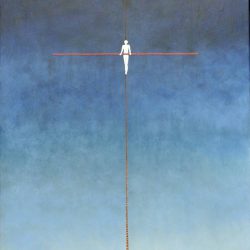
Sufletele mele-s doua / My souls are two
Sufletul mi-e un jucator pe sfoara.
Dar sufletele mele-s doua.
Unul intinde sfoara si o desfasoara
Necontenit, taioasa, vie, noua,
Si celuilalt «ridica-te si du-te»-i spune,
Si celalalt, rinjind i se supune.
Ochii acestuia de fiara sint
Si-l gauresc uitindu-se-n pamint
Si seaca apa si-ard pe sus
Soimii de vii, in zborul din apus.Monstrul din aer poate sa se lase
Purtat in bici pe firul de matase,
Cu talpa lui de piatra si pamint,
Parca purtat si leganat de vint.
Scrisneste.
S-a oprit.
Nu-i dau ragaz.
Biciul meu greu ii cade pe grumaz,
Pe umere, pe pulpe, pe picioare.
Racneste, urla, vrea sa se scoboare.Nu-i nici-o clipa de repaos.
Arunca-te si cazi in haos,
Si ametit, precipitat in el,
Sfarima-ncuietoarea de otel.
Tudor ARGHEZI
……………….
My souls are two
My soul is tightrope walker thru.
But my souls are two.
One stretches out the rope and unwinds it
Unceasingly, sharp, alive, new,
And tells the other “get up and go”,
And the other, grinning, does so.
His eyes are beast-like bound
While watching they are piercing the ground .
And they dry the water and burn in sight
The falcons alive, in their sunset flight.The monster in the air itself could let
Be whipped along the silken thread,
With its sole of stone and clay
As if by wind carried and swayed.
Grinds.
Stops.
I don’t give him a break.
My whip falls heavily on his neck,
his shoulders, his thighs, on his feet.
He roars, he shouts, he wants to descendThere is not a moment of rest or pause
Throw yourself and fall into the chaos,
And dizzy, plunged into havoc,
Shatter and break the steel lock.trad. M. M. Biela
Opowiadanie o starych kobietach / A story of old women / O poveste despre batrane
POSTED IN classic poetry July 25, 2023
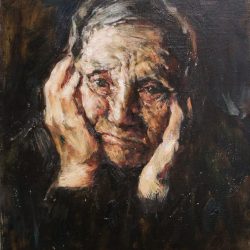
Opowiadanie o starych kobietach / A story of old women / O poveste despre batrane
Lubię stare kobiety
brzydkie kobiety
złe kobietysą solą ziemi
nie brzydzą się
ludzkimi odpadkami
znają odwrotną stronę
medalu
miłości
wiaryprzychodzą i odchodzą
dyktatorzy błaznują
mają ręce splamione
krwią ludzkich istotstare kobiety wstają o świcie
kupują mięso owoce chleb
sprzątają gotują
stoją na ulicy z założonymi
rękamimilczą
stare kobiety
są nieśmiertelneHamlet miota się w sieci
Faust gra rolę nikczemną i śmieszną
Raskolnikow uderza siekierą
stare kobiety są
niezniszczalne
uśmiechają się pobłażliwieumiera bóg
stare kobiety wstają jak co dzień
o świcie kupują chleb wino rybęumiera cywilizacja
stare kobiety wstają o świcie
otwierają okna
usuwają nieczystościumiera człowiek
stare kobiety
myją zwłoki
grzebią umarłych
sadzą kwiaty
na grobachlubię stare kobiety
brzydkie kobiety
złe kobietywierzą w życie wieczne
są solą ziemi
korą drzewa
są pokornymi oczami zwierząttchórzostwo i bohaterstwo
wielkość i małość
widzą w wymiarach właściwychzbliżonych do wymagań
dnia powszedniegoich synowie odkrywają Amerykę
giną pod Termopilami
umierają na krzyżach
zdobywają kosmosstare kobiety wychodzą o świcie
do miasta kupują mleko chleb
mięso przyprawiają zupę
otwierają oknatylko głupcy śmieją się
ze starych kobiet
brzydkich kobiet
złych kobietbo to są piękne kobiety
dobre kobietystare kobiety
są jajem
są tajemnicą bez tajemnicy
są kulą która się toczystare kobiety
są mumiami
świętych kotówsą małymi
wysychającymi źródłami
pomarszczonymi owocami
albo tłustymi
owalnymi buddamikiedy umierają
z oka wypływa
łza
i łączy się
na ustach z uśmiechem
młodej dziewczyny
Tadeusz Różewicz
……………………
A STORY OF OLD WOMEN
I like old women
ugly women
mean womenthey are the salt of the earth
they don’t abhor
human wastethey know the flipside
of the coin
of love
of faithcoming and going
dictators fool around
their hands are stained
with human bloodold women get up at dawn
they buy meat fruit bread
clean cook
stand on the street
arms foldedsilently
old women
are immortalHamlet is thrashing around in the net
Faust plays a wicked and ridiculous role
Raskolnikov strikes with an axeold women are
indestructible
they smile indulgentlygod dies
old women get up like every day
at dawn they buy bread wine fishcivilization dies
old women get up at dawn
open the windows
remove the filtha man dies
old women
wash the corpse
bury the dead
plant flowers
on the gravesi like old women
ugly women
mean womenthey believe in eternal life
they are the salt of the earth
Tree bark
the humble eyes of animalscowardice and heroism
greatness and pettiness
they see the right perspectiveclose to the demands
of everyday lifetheir sons discover America
perish at Thermopylae
they die on the cross
conquer the spaceold women go out to the city at dawn
to buy milk bread meat
to season the soup
they open the windowsonly fools laugh
at old women
ugly women
mean womenfor they are beautiful
good womenold women
they are an embryo
a mystery devoid of mystery
a rolling sphereold women
are the mummies
of sacred catsthey are either small
drying springs
wrinkled fruit
or plump
oval buddhaswhen they die a tear
flows from the eye
and joins
on the lips
with the smile
of a young girl.
………………..
O poveste despre bătrâne
Îmi plac bătrânele
femei urâte
releele sunt sarea pământului
ele nu detesta
deșeul uman
ele cunosc reversul
medaliei
al dragostei
al credinţeivin și pleacă
dictatorii care fac pe clovnii
cu mâinile pătate
de sângele-omenescbătrânele se trezesc în zori
cumpără pâine fructe carne
fac curatenie gatesc
stau în stradă cu bratele incrucisatetacute
femeile bătrâne
sunt nemuritoareHamlet se zbate în plasă
Faust joacă un rol răutacios și ridicol
Raskolnikov lovește cu un topor
femeile bătrâne sunt
indestructibile
ele zâmbesc îngăduitoareDumnezeu moare
bătrânele se trezesc ca în fiecare zi
în zori cumpără pâine vin peștecivilizația moare
bătrânele se trezesc în zori
deschid ferestrele
îndepărtează murdariamoare un om
bătrânele
spală cadavrul
îngroapă mortul
plantează flori
pe morminteimi plac femeile batrane
femei urâte
femei releele cred în viața veșnică
sunt sarea pământului
scoarta copacului
sunt ochii umili ai animalelorlașitate și eroism
măreție și micime
ele văd prin prisma potrivitasimilara cerintelor
vietii de zi cu zifiii lor descoperă America
se pierd la Termopile
mor crucificati
cuceresc universulbătrânele pleaca în oras de cu zori
cumpără lapte pâine carne
condimenteaza supa
deschid ferestrelenumai prostii rad
de femeile bătrâne
femei urâte
femei relepentru că sunt femei frumoase
femei bunefemei bătrâne
sunt un embrion
sunt un mister fara de mister
sunt o minge care se da de-a durafemeile bătrâne
sunt mumiile
pisicilor sfintesunt fie mici
izvoare uscate
fructe încrețite
sau buddha gras
si ovalcând mor, o lacrima
curge din ochi
și se uneste
pe buze cu zâmbetul
unei fete tinere.
trad. M. M. Biela
Repetabila povară / The repeatable burden
POSTED IN classic poetry, Romanian July 14, 2023
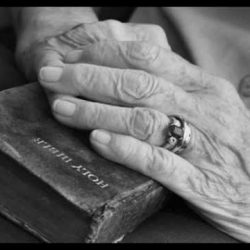
Repetabila povară / The repeatable burdenCine are părinţi, pe pământ nu în gând
Mai aude şi-n somn ochii lumii plângând
Că am fost, că n-am fost, ori că suntem cuminţi,
Astăzi îmbătrânind ne e dor de părinţi.Ce părinţi? Nişte oameni ce nu mai au loc
De atâţia copii şi de-atât nenoroc
Nişte cruci, încă vii, respirând tot mai greu,
Sunt părinţii aceştia ce oftează mereu.Ce părinţi? Nişte oameni, acolo şi ei,
Care ştiu dureros ce e suta de lei.
De sunt tineri sau nu, după actele lor,
Nu contează deloc, ei albiră de dor
Să le fie copilul c-o treaptă mai domn,
Câtă muncă în plus, şi ce chin, cât nesomn!Chiar acuma, când scriu, ca şi când aş urla,
Eu îi ştiu şi îi simt, pătimind undeva.
Ne-amintim, şi de ei, după lungi săptămâni
Fii bătrâni ce suntem, cu părinţii bătrâni
Dacă lemne şi-au luat, dacă oasele-i dor,
Dacă nu au murit trişti în casele lor…
Între ei şi copii e-o prăsilă de câini,
Şi e umbra de plumb a preazilnicei pâini.Cine are părinţi, pe pământ nu în gând,
Mai aude şi-n somn ochii lumii plângând.
Că din toate ce sunt, cel mai greu e să fii
Nu copil de părinţi, ci părinte de fii.Ochii lumii plângând, lacrimi multe s-au plâns
Însă pentru potop, încă nu-i de ajuns.
Mai avem noi părinţi? Mai au dânşii copii?
Pe pământul de cruci, numai om să nu fii,Umiliţi de nevoi şi cu capul plecat,
Într-un biet orăşel, într-o zare de sat,
Mai aşteaptă şi-acum, semne de la strămoşi
Sau scrisori de la fii cum c-ar fi norocoşi,
Şi ca nişte stafii, ies arare la porţi
Despre noi povestind, ca de moşii lor morţi.Cine are părinţi, încă nu e pierdut,
Cine are părinţi are încă trecut.
Ne-au făcut, ne-au crescut, ne-au adus până-aci,
Unde-avem şi noi însine ai noştri copii.
Enervanţi pot părea, când n-ai ce să-i mai rogi,
Şi în genere sunt şi niţel pisălogi.
Ba nu văd, ba n-aud, ba fac paşii prea mici,
Ba-i nevoie prea mult să le spui şi explici,
Cocoşaţi, cocârjaţi, într-un ritm infernal,
Te întreabă de ştii pe vre-un şef de spital.
Nu-i aşa că te-apucă o milă de tot,
Mai cu seamă de faptul că ei nu mai pot?
Că povară îi simţi şi ei ştiu că-i aşa
Şi se uită la tine ca şi când te-ar ruga…Mai avem, mai avem scurtă vreme de dus
Pe conştiinţă povara acestui apus
Şi pe urmă vom fi foarte liberi sub cer,
Se vor împutina cei ce n-au şi ne cer.
Iar când vom începe şi noi a simţi
Că povară suntem, pentru-ai noştri copii,
Şi abia într-un trist şi departe târziu,
Când vom şti disperaţi veşti, ce azi nu se ştiu,
Vom pricepe de ce fiii uită curând,
Şi nu văd nici un ochi de pe lume plângând,
Şi de ce încă nu e potop pe cuprins,
Deşi plouă mereu, deşi pururi a nins,
Deşi lumea în care părinţi am ajuns
De-o vecie-i mereu zguduită de plâns.Adrian PAUNESCU
………………
The repeatable burden
Whoever has parents, on this earth not in thought
He still hears in sleep the eyes of the world sob
If we were, if we weren’t, or if we are kind,
Today we get older with our parents in mind.What parents? Some people who no longer can fit
By so many children and so much mistreat
Some crosses, alive yet, breathing harder and shy,
Are these parents of ours who always sigh.What parents? Some people there too, with some dreams
Who painfully know what each penny means.
Whether young or not, as their papers provide,
Doesn’t matter at all, they’ve turned grey and abide.
To see their child land a step higher and deep,
How much work, and torment, and nights with no sleep!
Even now, when I’m writing, as if screaming I’d bear,
I know them, I feel them, suffering somewhere.
We remember of them, after long weeks on hold
Old sons what we are, with our parents old
Did they buy firewood, do they ache in their bone,
Didn’t they die sad in their house alone…
Between them and children is a progeny of dread,
And the shadow of lead of our daily bread.
Whoever has parents, on this earth not in thought
He still hears in sleep the eyes of the world sob
For the hardest to be is of all that exists
Not a child of parents, but a parent of kids.
From the eyes of the world many tears have been wept
But for heavenly flood not enough weeping yet.
Do we still have parents? Do they still children have?
On this earth of crosses to be man not to crave.
By their needs humbled and with their head bowed
In a poor little town, in a village remote,
Even now they are waiting from their elders a sign ,
Or letters from children telling that they are fine,
Like some ghosts they come rarely out to the gates,
Talking only of us like some dear dead fates.
Who has parents alive isn’t lost yet, at last
Who has parents alive he still has a past.
They made us, they raised us, they brought us so far,
Where we have our own children and parents we are.
They may seem annoying, when there’s no more to give,
They may get on our nerves, that is the narrative.
Either blind, either deaf, either slow on their lane,
Either it takes too long to tell them and explain,
Hunch-backed and stooping like carrying a cross,
They ask if you know of a hospital boss.
Don’t you feel a deep, strange pity at all
For they can’t do a thing by themselves anymore?
That you feel them as burden and they know that it’s true,
And they look at you as if they’d beg of you…
We still have a short time to bear and to shrine
On our conscience the burden of this sacred decline
After that under skies we shall be very freed,
There will be less of those who don’t have and who need.
And someday the time comes when feel it we shall
That a burden we are for our children as well,
And only at a sad and not a distant day ,
When we’ll know with despair news not known today,
We’ll get why the children so soon do forget,
And they see not an eye in the world cry regret,
Why throughout the earth there is still no flood,
Even though it’s been raining, even though it has snowed,
Even though the world where as parents we’re trying,
For an eternity has been shaken by crying.
TO MY FATHER, rest in peace…
trad. M. M. Biela
Kto jest poetą / Cine este poetul / Who is the poet
POSTED IN classic poetry July 13, 2023
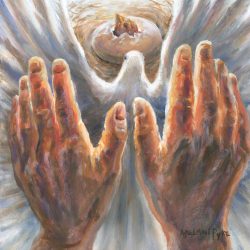
Kto jest poetą / Cine este poetul / Who is the poet
poetą jest ten który pisze wiersze
i ten który wierszy nie piszepoetą jest ten który zrzuca więzy
i ten który więzy sobie nakładapoetą jest ten który wierzy
i ten który uwierzyć nie możepoetą jest ten który kłamał
i ten którego okłamanopoetą jest ten co ma usta
i ten który połyka prawdęten który upadał
i ten który się podnosipoetą jest ten który odchodzi
i ten który odejść nie może
Tadeusz Różewicz
………………..Cine este poetul
poetul este cel care scrie poezii
si cel care nu scrie poeziipoetul este cel care rupe lanturile
şi cel care se inlantuiepoetul este cel care crede
și cel care nu poate credepoetul este cel care a mințit
iar cel care a fost minţitun poet este cel care are o gură
și cel care înghite adevărulcel care cade
si cel care se ridicăpoetul este cel care pleaca
și cel care nu poate pleca
………………..Who is the poet
a poet is he who writes poems
and he who doesn’t write poemsthe poet is he who breaks the bonds
and he who binds himselfthe poet is he who believes
and he who cannot believethe poet is he who has lied
and he who has been lied toa poet is he who has a mouth
and he who swallows the truththe one who fell
and the one who risesthe poet is he who leaves
and he who cannot leave
trad. M. M. Biela
Domowe ćwiczenia na temat aniołów / Homework on angels / Tema pentru acasa despre ingeri
POSTED IN classic poetry July 8, 2023
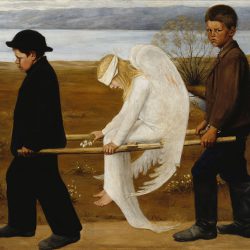
Domowe ćwiczenia na temat aniołów / Homework on angels / Tema pentru acasa despre ingeri
Anioły
strąconesą podobne
do płatków sadzy
do liczydeł
do gołąbków nadziewanych
czarnym ryżem
są też podobne do gradu
pomalowanego na czerwono
do niebieskiego ognia
z żółtym językiemanioły strącone
są podobne
do mrówek
do księżyców które wciskają się
za zielone paznokcie umarłychanioły w raju
są podobne do wewnętrznej strony uda
niedojrzałej dziewczynkisą jak gwiazdy
świecą w miejscach wstydliwych
są czyste jak trójkąty i koła
mają w środku ciszęstrącone anioły
są jak otwarte okna kostnicy
jak krowie oczy
jak ptasie szkielety
jak spadające samoloty
jak muchy na płucach padłych żołnierzy
jak struny jesiennego deszczu
co łączą usta z odlotem ptakówmilion aniołów
wędruje
po dłoniach kobietysą pozbawione pępka
piszą na maszynach do szycia
długie poematy w formie
białego żaglaich ciała można szczepić
na pniu oliwkiśpią na suficie
spadają kropla po kropliTadeusz Różewicz
………………….
Homework on angels
Fallen
angelsare
like soot flakes
like abacuses
like cabbage rolls
stuffed with black rice
like hail
painted red
like a blue fire
with yellow tonguefallen angels
are
like ants
like the moons embedded
under the green nails of the deadangels in paradise
they are like inner thighs
of an immature girllike the stars
they shine in shameful places
they are pure like triangles and circles
quiet insidefallen angels
they are like the open windows of a morgue
like a cow’s eyes
bird skeletons
like falling planes
the flies on the fallen soldiers’ lungs
like strings of autumn rain
that connects the lips with the flight of birdsa million angels
wander
over the palms of a womanno belly button
they write on sewing machines
long poems in the form of a
white sailtheir bodies can be grafted
onto the trunk of an olive treethey sleep on ceilings
they fall drop by drop
………………….Tema pentru acasa despre ingeri
Îngerii
cazutisunt
ca fulgii de funingine
ca abacurile
ca sarmalele de varză umplute
cu orez negru
ca o grindina
vopsita în roșu
ca un foc albastru
cu limbă galbenăîngerii cazuți
sunt
ca furnicile
ca lunile infipte
sub unghiile verzi ale morțilorîngerii în paradis
sunt precum coapsele
unei fete necoapteca stelele
strălucesc în locuri rușinoase
sunt puri ca triunghiurile și cercurile
liniștiți înlăuntrul lorIngerii cazuti
sunt ca ferestrele deschise ale unei morgi
ca ochii vacii
scheletele păsărilor
ca avioanele cazande
muștele pe plămânii soldaților căzuți
ca firele ploii de toamnă
ce leagă buzele de zborul păsărilorun milion de îngeri
ratacesc
peste palmele unei femeilipsiti de buric
ei scriu pe mașinile de cusut
lungi poeme sub formă de
corabie albatrupurile lor pot fi altoite
pe trunchiul unui măslindorm pe tavane
cad picătură cu picăturătrad. M. M. Biela
UNDE MALUM?
POSTED IN classic poetry July 8, 2023
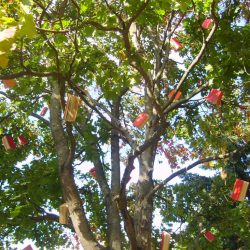
UNDE MALUM?Skąd się bierze zło?
jak to skąd
z człowieka
zawsze z człowieka
i tylko z człowiekaczłowiek jest wypadkiem
przy pracy
natury
jest
błędemjesli rodzaj ludzki
wyczesze się
własnoręcznie
z fauny i floryziemia odzyska
swój blask i uroknatura swą czystość
i nie-winnośćżadne stworzenie poza
człowiekiem
nie posługuje się słowem
które może być narzędziem
zbrodnisłowem które kłamie
kaleczy zarazazło nie bierze się z braku
ani z nicościzło bierze się z człowieka
i tylko z człowiekajesteśmy w myśli jak
powiada Kant
a tym samym odtąd w bycie
inni niż czysta natura
Tadeusz Rózewicz…………………………………….
UNDE MALUM?
Where does evil come from?
what does it mean where from
from man
always from man
and only from manman is an accident
of
nature
a
mistakeif human race
disembroils
itself
from fauna and florathe earth will regain
its splendour and charmnature its purity
and innocenceno creature beyond
human
doesn’t use a word
which can be a tool
crimea word that lies
a blightevil does not come from void
nor from nothingnessevil comes from man
and only from manwe are in thought
as Kant says
and thus in being
other than pure nature………………………………….
UNDE MALUM?
De unde vine răul?
cum adica de unde
de la om
mereu de la om
si numai de la om
omul este un accident
de creatie
al naturii
este
o eroaredacă omenirea
s-ar descalci
de
faună și florăpământul si-ar recapata
splendoarea și farmeculnatura si-ar recapata
puritatea si inocentanici o creatură in afara
de om
nu rostește un cuvânt
care poate fi un instrument
al crimeiun cuvânt care aduce
nenorocirerăul nu vine din nimic
nici din neantrăul vine de la om
și numai de la omsuntem prin gandire dupa cum
spune Kant
şi prin fiinţă
diferiti de natura pură
trad. M. M. Biela
Tis easier to pity those when dead / E mai usor sa ierti pe cei muriti
POSTED IN classic poetry April 10, 2023
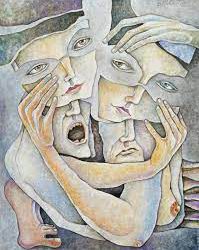
Tis easier to pity those when dead / E mai usor sa ierti pe cei muriti‘Tis easier to pity those when dead
That which pity previous
Would have saved —
A Tragedy enacted
Secures Applause
That Tragedy enacting
Too seldom does.EMILY DICKINSON
………………..
E mai usor sa ierti pe cei muriti
E mai usor sa ierti pe cei muriti
Decat pe cei pe care mila ta
I-ar mai putea salva –
O Drama performata
Aplauze primește
Pe care-o drama performanda
Prea rar le dobândește.trad. M. M. Biela
GOOD BYE / ADIO
POSTED IN classic poetry April 8, 2023
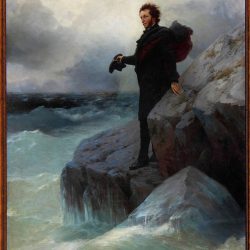
GOOD BYE / ADIO
Good-bye, proud world! I’m going home:
Thou art not my friend, and I’m not thine.
Long through thy weary crowds I roam;
A river-ark on the ocean brine,
Long I’ve been tossed like the driven foam;
But now, proud world! I’m going home.Good-bye to Flattery’s fawning face;
To Grandeur with his wise grimace;
To upstart Wealth’s averted eye;
To supple Office, low and high;
To crowded halls, to court and street;
To frozen hearts and hasting feet;
To those who go, and those who come;
Good-bye, proud world! I’m going home.I am going to my own hearth-stone,
Bosomed in yon green hills alone, —
A secret nook in a pleasant land,
Whose groves the frolic fairies planned;
Where arches green, the livelong day,
Echo the blackbird’s roundelay,
And vulgar feet have never trod
A spot that is sacred to thought and God.O, when I am safe in my sylvan home,
I tread on the pride of Greece and Rome;
And when I am stretched beneath the pines,
Where the evening star so holy shines,
I laugh at the lore and the pride of man,
At the sophist schools, and the learned clan;
For what are they all, in their high conceit,
When man in the bush with God may meet?Ralph Waldo EMERSON
………………..ADIO
Adio, lume mândră! Plec:
Nu-mi ești prieten, nici eu tie.
Printre cei franti de mult timp trec ;
Luntre pe-a valului furie,
Zvarlit ca spuma spre esec;
Dar acum, lume mândră! Plec.Adio, Lingusirii false;
Grandorii cu docte grimase;
Bogăției cu ochi ascuns
Birocratiei, jos și sus;
Holuri, tribunale și străzi;
Inimi de gheata, pasii repezi;
Celor ce vin, sau se petrec;
Adio, lume mândră! Plec.Mă duc la propria mea vatră,
Ascunsa-n dealuri verzi de piatra, —
Un colț secret de drag pamant,
Cu cranguri unde zane sunt;
Verde rasuna ziua-ntreaga,
Al mierlei cant ecou se leaga,
Și pasi vulgari n-au mers nicicand
Pentru Domnul si gand loc sfant.Când în siguranț-acas-oi fi,
Pe mândria Greciei și-a Romei voi pasi;
Și când sub pini intins voi fi stand,
Unde Luceafarul luceaste-asa de sfânt,
Voi râde de-a omului mândrie in pacat ,
De şcolile sofiste, şi clanul învăţat;
Căci ei toți, în marea lor trufie, ce pot sti,
Când omul în tufișuri cu Domnul poate fi?trad. M. M. Biela
THE LAKE ISLE OF INNISFREE / INSULA DE PE LACUL INNISFREE
POSTED IN classic poetry March 27, 2023
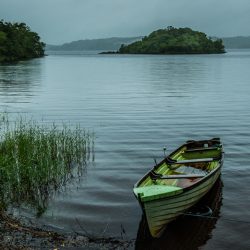
THE LAKE ISLE OF INNISFREE / INSULA DIN LACUL INNISFREEI will arise and go now, and go to Innisfree,
And a small cabin build there, of clay and wattles made;
Nine bean-rows will I have there, a hive for the honey-bee,
And live alone in the bee-loud glade.And I shall have some peace there, for peace comes dropping slow,
Dropping from the veils of the morning to where the cricket sings;
There midnight’s all a glimmer, and noon a purple glow,
And evening full of the linnet’s wings.I will arise and go now, for always night and day
I hear lake water lapping with low sounds by the shore;
While I stand on the roadway, or on the pavements grey,
I hear it in the deep heart’s core.William Butler YEATS
…………………Insula din Lacul Innisfree
Mă voi scula si-oi merge acum spre Innisfree,
Colib-oi face-acolo din lut si din glicine;
Nouă vreji de fasole-oi avea si-un stup de-albine,
Și-n poiana cu zumzet eu singur voi trai.Și-oi avea pace-acolo, usure picurand,
Din voalul zorilor pana unde greierul imbie;
Si miezul nopți-i licăr, amiaza-i purpurie,
Iar seara-i plină de canepari fluturand.Mă voi scula si-oi merge, caci mereu noapte, zi
Aud cum clipoceste lacul pe langa mal;
În timp ce stau pe drumuri, sau trotuare gri,
In miezul inimii adânc aud un val.trad. M. M. Biela

Copyright © 2023 by Magdalena Biela. All rights reserved.